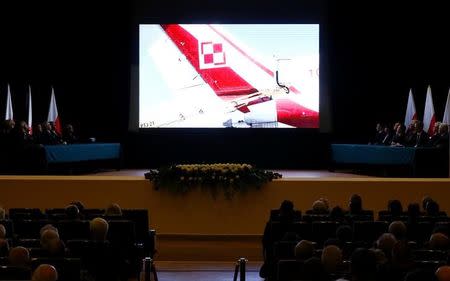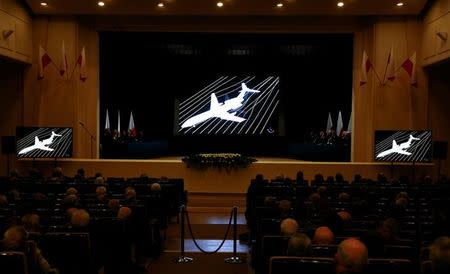Polish leader's jet probably exploded just before 2010 crash - commission
By Marcin Goettig and Pawel Sobczak WARSAW (Reuters) - The plane that crashed and killed Poland's president and 95 others in 2010 probably disintegrated in mid-air when explosives were detonated on board, a Polish government commission said on Monday - a theory that a member of a previous commission dismissed as "propaganda". The new commission presented its preliminary findings on the seventh anniversary of the catastrophe in western Russia, which killed President Lech Kaczynski and his wife, top army brass and several lawmakers. "Much indicates that on April 10, 2010, an explosion took place on board of the government Tupolev plane," said the commentary accompanying video material presented by the commission on Monday. For a link to the video, click http://podkomisjasmolensk.mon.gov.pl/pl/1_16.html "As a result of the conducted experiments, we can say that the most likely cause of the explosion was a thermobaric charge initiating a strong shockwave." But a member of the previous Polish official commission to investigate the Smolensk crash, Maciej Lasek, dismissed the findings published on Monday as "illusions presented by people who had never investigated air crashes before." "This is propaganda aimed at strengthening the faith ... in hypothetical causes of this accident," Lasek told private broadcaster TVN24. Lasek was head of the state body to investigate air crashes from 2012 until he was dismissed from the post by the current government of the Law and Justice (PiS) party last year. The earlier commission, created by the previous government, blamed mistakes by the Polish pilots and Russian air traffic controllers for the crash. A Russian report blamed the Poles. The PiS government last month accused European Council President Donald Tusk of working with Russian President Vladimir Putin to harm Polish interests following the plane crash. Tusk was Polish prime minister at the time. The new investigatory commission, created by Defence Minister Antoni Macierewicz, said on Monday that a blast most likely tore the plane into pieces, killing all 96 people seconds before it hit the ground. It repeated allegations, first made in Warsaw a week ago, that Russian air traffic controllers had deliberately set the plane on the wrong descent path. Polish prosecutors said then they would press charges against two controllers. Moscow rejected the allegations. FRAGMENTS The crash took place as pilots attempted to land a Soviet-made TU-154 at a rarely used airport near Smolensk to take part in commemorations of thousands of Polish officers executed there by Soviet secret police in 1940. The commission report said that besides large pieces of wreckage, there was a multitude of smaller fragments, a fact that could be explained by an explosion. Russia has so far refused to return the wreckage of the jet to Poland, a member of NATO and the European Union, citing its own continuing investigation. The commission also said that at least four victims of the crash had significant burns on their bodies, although they were found away from flames on the crash site. One of the plane doors penetrated the ground to a depth of one metre, suggesting it had been travelling 10 times faster than the plane's speed, it said. The commission said it had ordered a reconstruction of part of the TU-154 plane and blown it up with a thermobaric charge, adding that the damage resembled that done in the Russian crash. Polish prosecutors last year ordered the coffins of crash victims to be reopened to check for traces of explosives. This process will continue until next year, prosecutors said earlier this month. The commission's findings are likely to worsen relations with Moscow - already strained over the conflict in Ukraine - and increase domestic political tensions in Poland. (Writing by Marcin Goettig; editing by Andrew Roche, Larry King)




